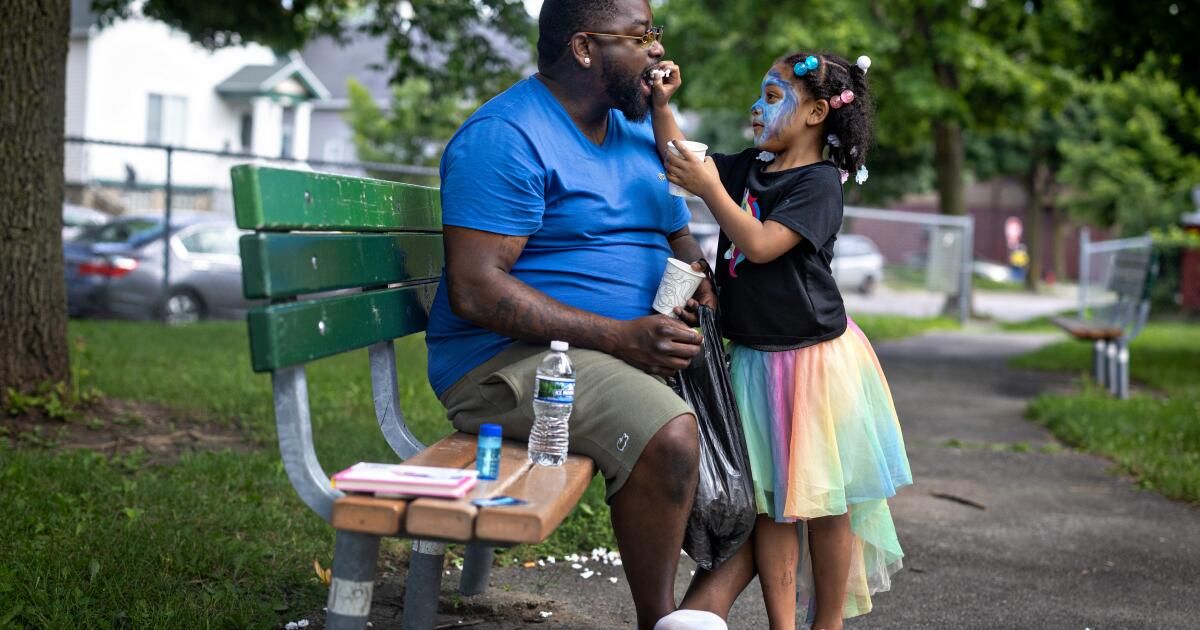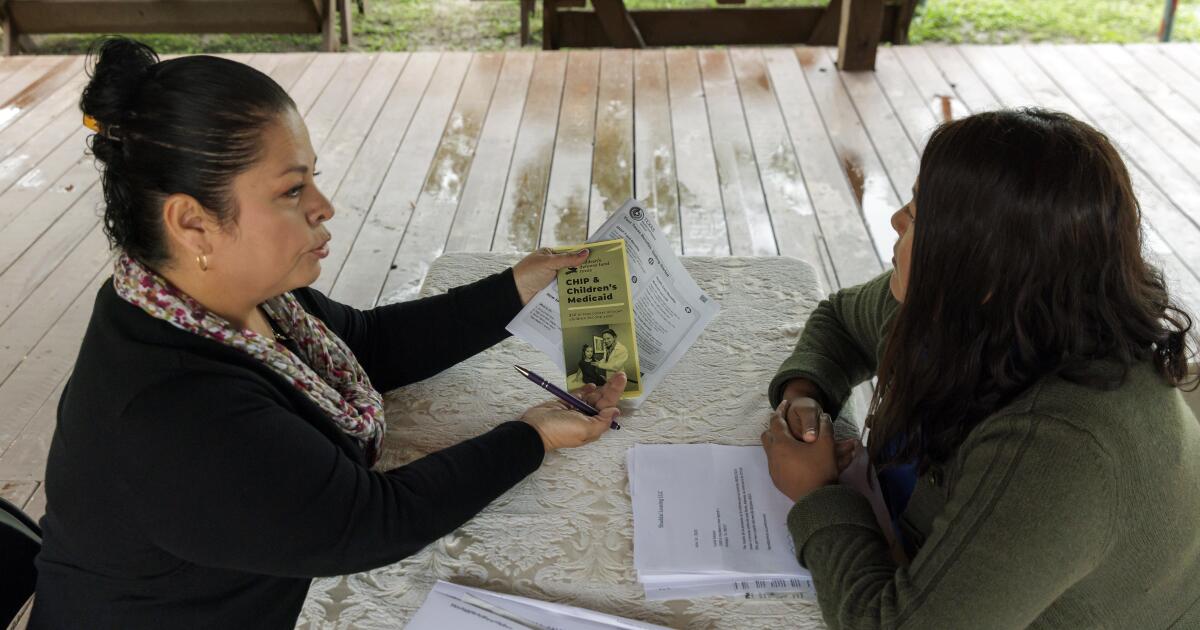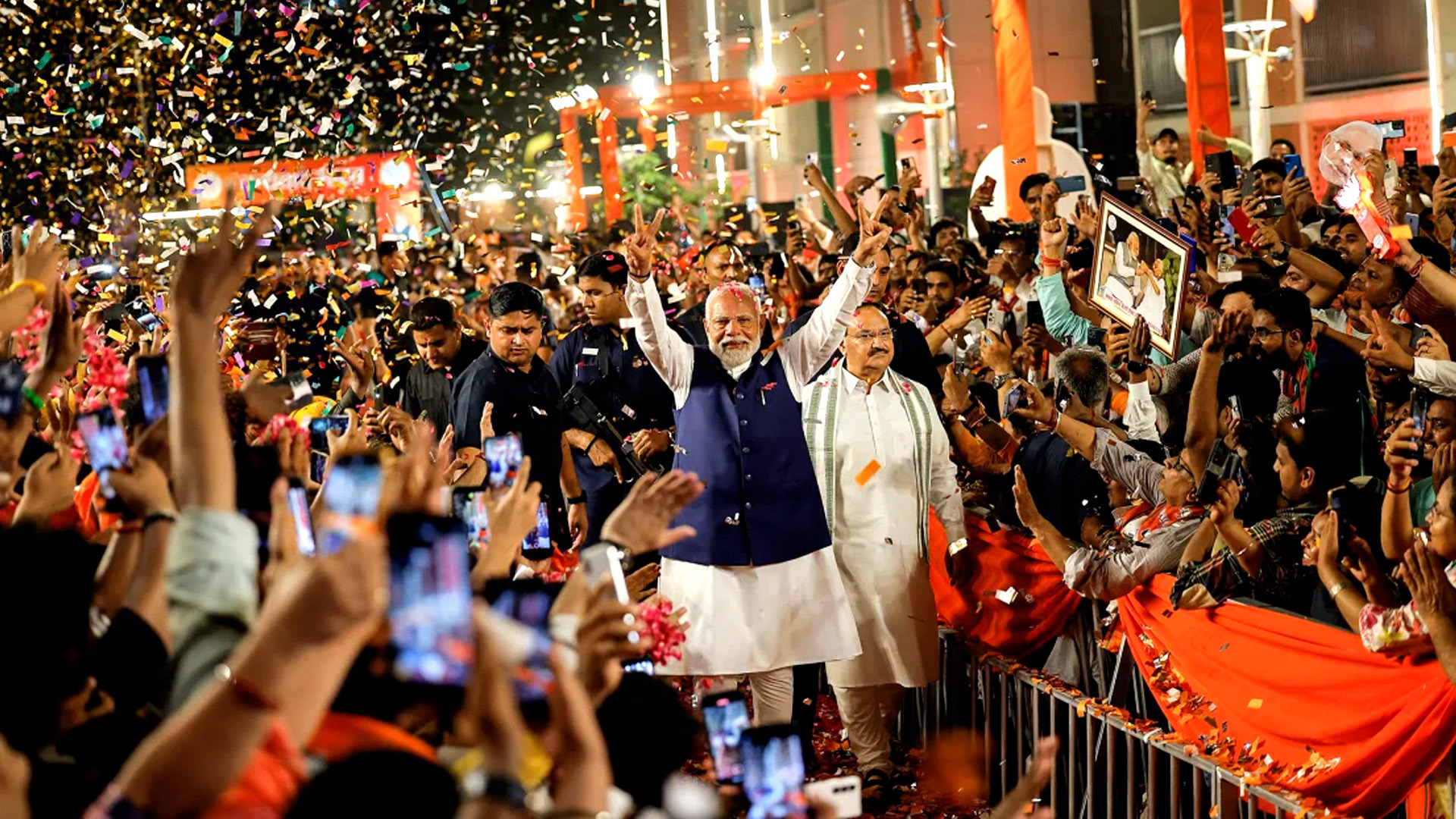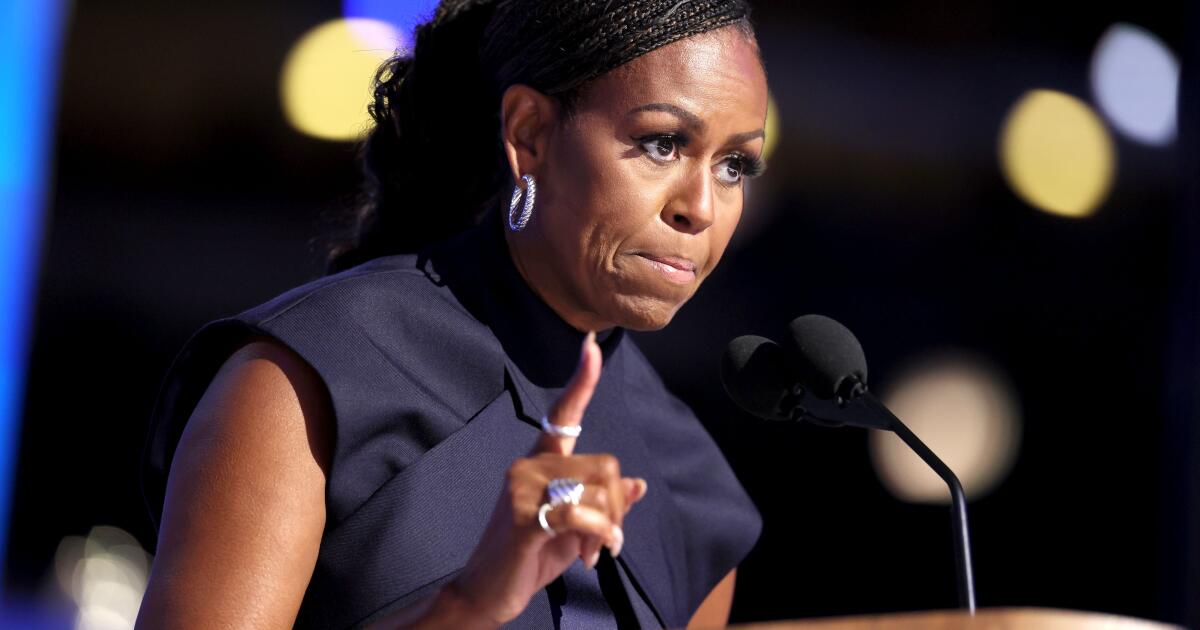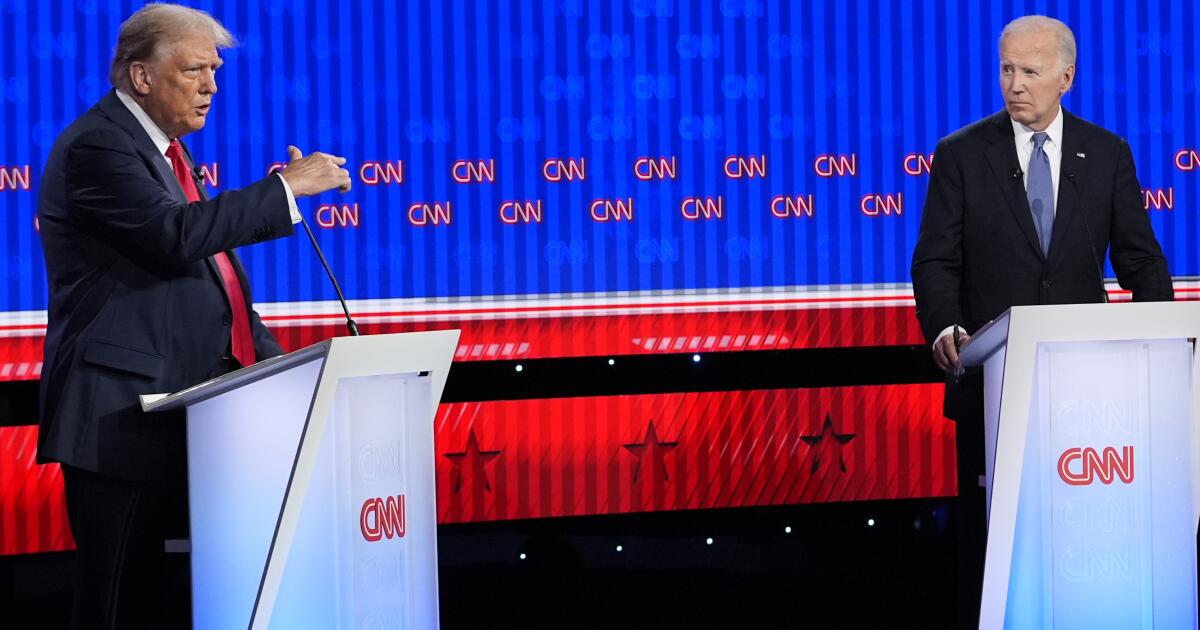Lisa Collins sat in the shade of a green ash tree Wednesday in Milwaukee’s Lindsay Heights neighborhood, handing out free hot dogs and hamburgers as part of a “joyful rebellion” against the nearby Republican National Convention.
Although she plans to vote for President Biden in the upcoming election, she is not doing so without fear.
“I got so angry in that debate that I said I wouldn’t vote, I just wouldn’t,” she said of Biden’s terrible performance. “But you know I will.”
Theirs is a kind of ambivalence common in this part of town, where the dreams of black Americans have blossomed, withered and risen again, in a city and state that will play a pivotal role in deciding which candidate wins the Oval Office.
Lisa Collins works the food station at the Milwaukee Childcare Collective event during the Republican convention.
(Jason Armond / Los Angeles Times)
Much of the world is fixated on big questions: Would a second term for Donald Trump be a step toward authoritarianism? Is Biden mentally competent? Should Biden step aside, and if he did, could Kamala Harris run a successful campaign? Should he be left to an open field of Democratic contenders?
But in Lindsay Heights, as in many other places, many people have not yet thought about the election. Those who have are often not interested in those introspective questions that dominate the headlines.
At this event organized by the Milwaukee Childcare Collective, most people didn't know they had gathered in response to the convention. They came to get their faces painted and eat, and their concerns are more mundane: teaching kids to read, paying bills, finding a napkin to wipe ice cream juice off of toddlers' chubby legs.
Deshay Majors, sitting with his son and young daughter, the one with the sticky knees, said he hasn't decided yet who he will vote for.
“It all depends on what they're talking about,” he said of how he'll make his decision, though he's not sure what issues will influence him or what he wants to hear.
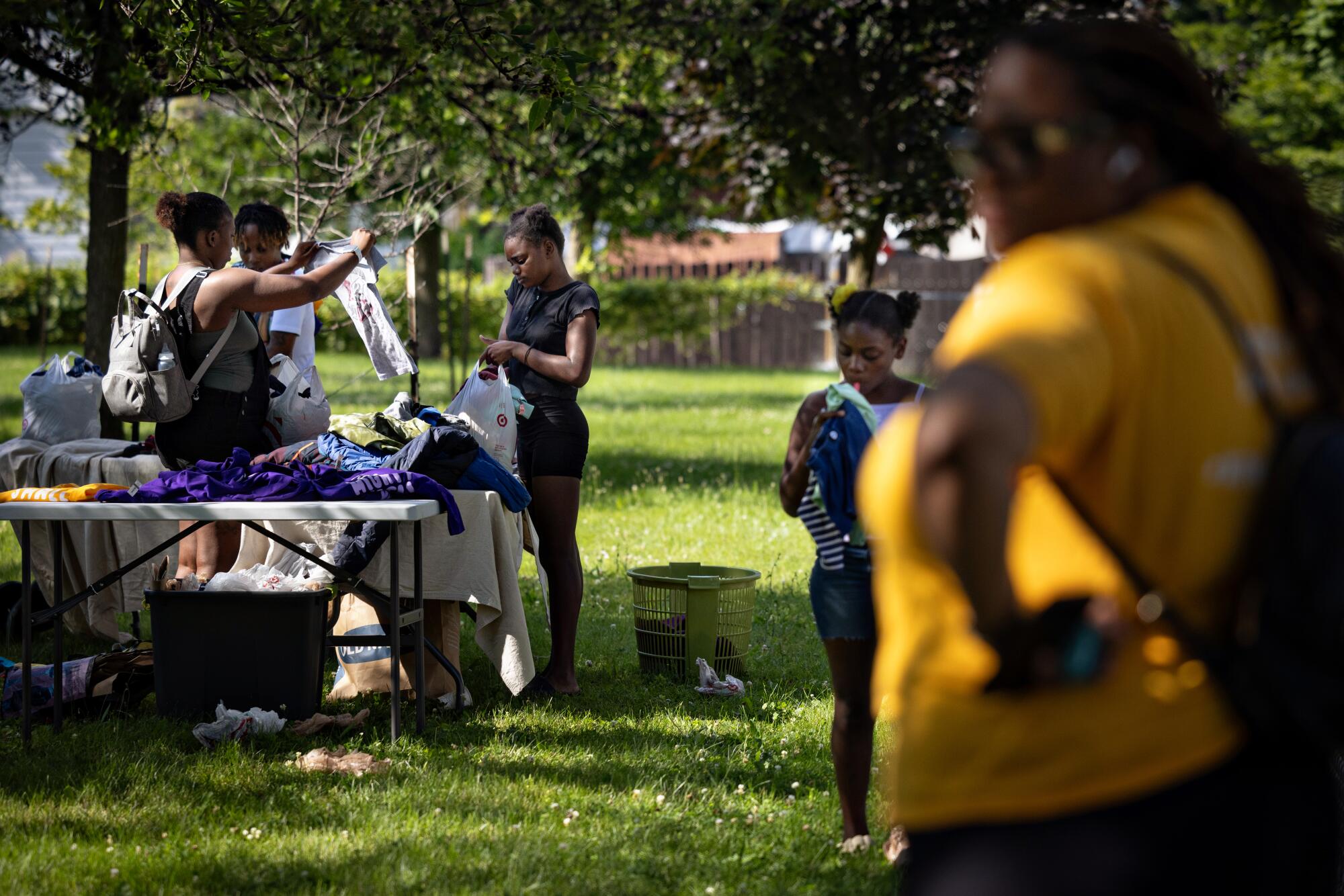
Community members get free clothing at Milwaukee Childcare Collective event.
(Jason Armond / Los Angeles Times)
It's a reminder that it's not over until it's over, but time is running out.
On the domestic front, there is an air of despondency. Many are convinced that as long as Biden remains at the top of the ticket, the party is destined to lose the White House. Possibly with a landslide victory for Trump. Very likely, in addition to losing control of the Senate.
Even before his debate debacle, Biden was struggling to match his performance from four years ago with Black voters, a vital Democratic constituency, especially in key swing states.
Paul Maslin, who has been conducting polls and strategizing political contests since the days of Jimmy Carter, estimates Biden’s chances of reelection are “slim to none.”
“And scarce,” he said, “is making reservations to leave the city.”
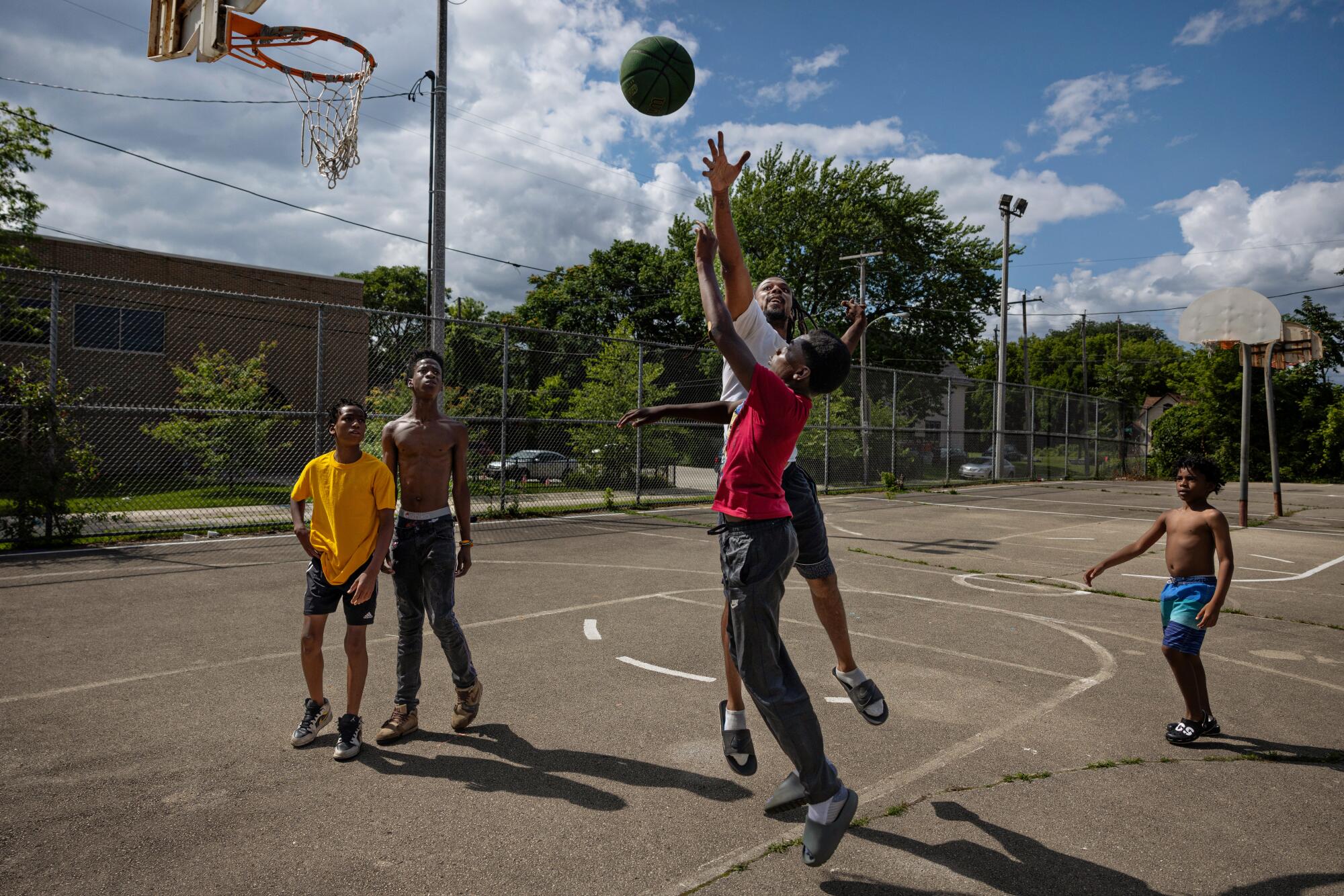
Children play basketball at the Milwaukee Childcare Collective event.
(Jason Armond / Los Angeles Times)
A recent Associated Press-University of Chicago poll found that nearly two-thirds of Democrats surveyed said Biden should drop out of the presidential race and let his party nominate someone else.
Biden's standing among independent and undecided voters is even worse, said Maslin, who has decades of experience in Wisconsin politics.
“His campaign should have told him, or should have told him, ‘Mr. President, one thing the voters you need to win this election have in common is that they don’t like you,’” Maslin said. “They owe it to themselves, to him, to the party, to the country.”
The Democratic elite (the “elites” Biden has railed against) are voting with their wallets.
“I can tell you, having spoken to many donors, that their depression and despair have turned into anger,” said Paul Begala, a strategist who twice helped lead Bill Clinton to the White House. “They are very angry. And angry people don’t donate.”
But that outrage has not reached this small park, where the basketball hoops lack nets and the nearest bathroom is in a nearby church.
The area is named for Bernice Lindsay, the first black woman to earn a journalism degree from Ohio State University. She moved to these narrow streets north of downtown in the 1920s, intending to help create a place where black professionals could own homes and raise families. For a time, the community thrived, until highways, violence and neglect plunged it into decline, like so many other minority enclaves in America.
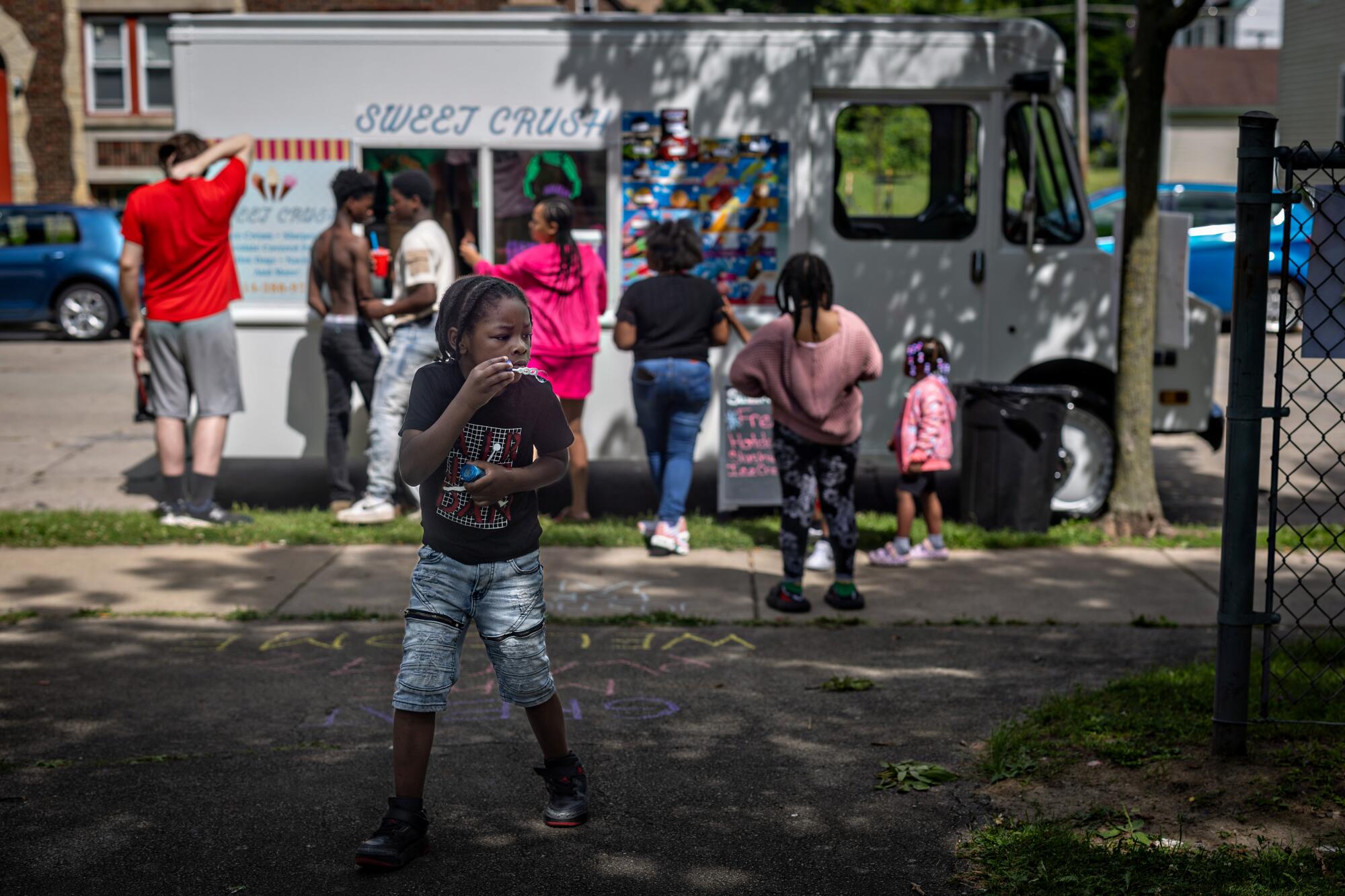
Children gather for free ice cream at the Milwaukee Childcare Collective event.
(Jason Armond / Los Angeles Times)
Now, it's a community working to get back on its feet. Empty orchards are growing strawberries and residents are organizing to help themselves and get what they need from a government that has too often ignored them, whether Democrat or Republican.
Some of the Victorian and Queen Anne style homes are fixed up, others are boarded up, and most have front porches where people gather.
Sheyenne Wilson, 25, has been visiting those porches to talk about Biden, though the organizer says she prefers to listen.
What she hears is neither pro-Biden nor pro-Trump, but rather pro-Lindsay Heights.
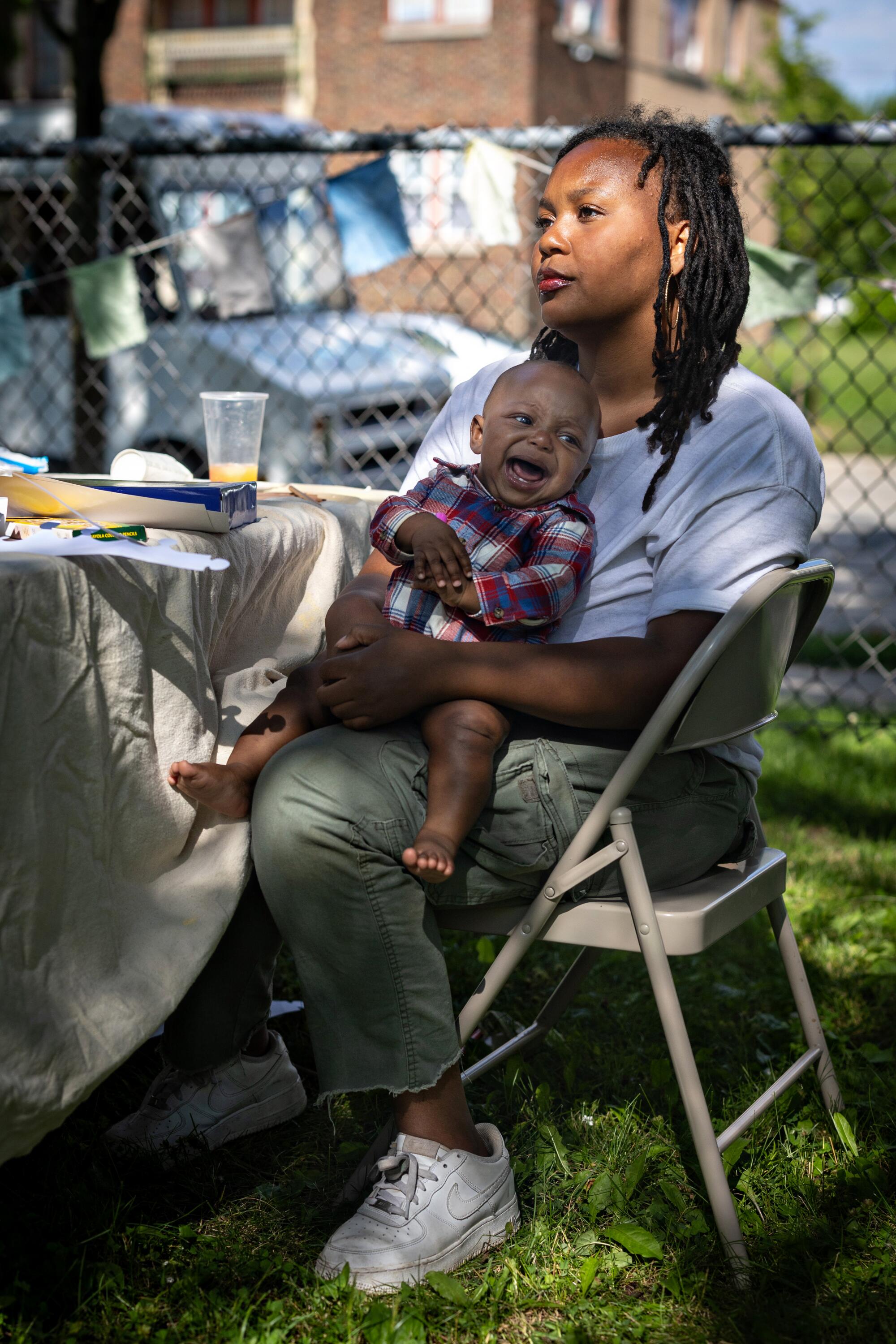
Sheyenne Wilson, with her son, Khalif El, is a Biden campaign organizer.
(Jason Armond / Los Angeles Times)
“Basically, people want someone who supports the community,” she said, holding her 10-month-old son, Khalif, on her lap.
That's the starting point he's using, according to fellow organizer Trasus Wright. He sees abortion as the kind of personal issue that can sway voters — even his wife, Dea Wright, is undecided.
Dea Wright likes Trump's stance on school choice: Her six children have benefited from the program, she said.
“What bothers me about Trump is that they are starting to talk about Christianity in schools,” he said.
Trasus Wright said he is not worried about his wife's uncertainty because he believes “Joe will convince her. His policies in defense of women will be what matters.”
What about Biden, who is too old?
“They're both old,” said Eric Donelson, unfazed by reports of Biden's mental decline as he ate a burger.
And what about Vice President Kamala Harris? Would she be a better candidate?
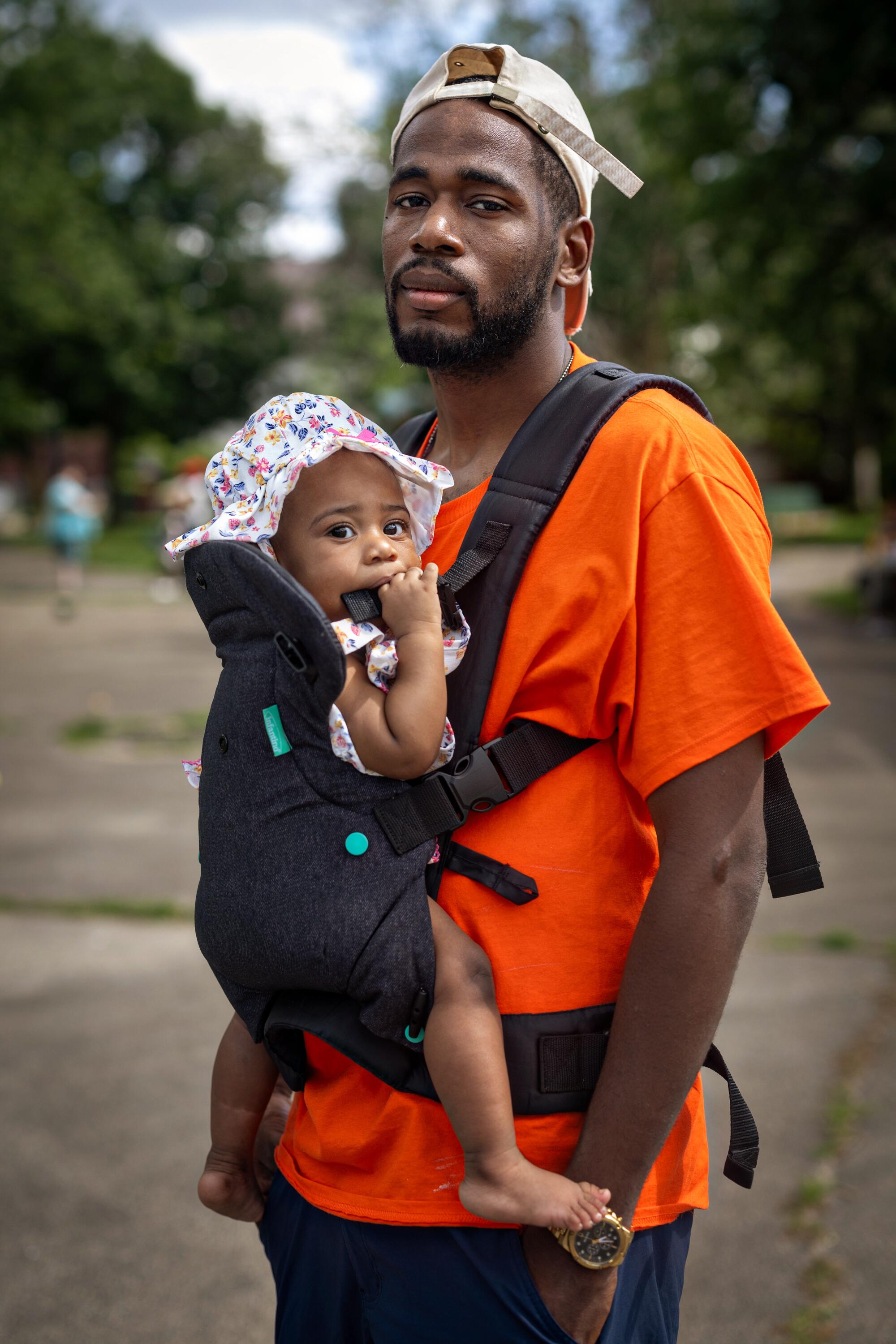
Robert Jackson and his daughter, Blessing, at the Milwaukee Childcare Collective event.
(Jason Armond / Los Angeles Times)
“Do we vote for someone just because they look like us or because of what they stand for?” asked Wilson, who is concerned about Harris’ past as a prosecutor.
“I still don’t believe there will ever be a female president,” said Collins, the woman handing out food.
“We forget that she is vice president. She doesn’t talk,” Donelson said. “Talk, woman.”
And what about the others? There are no names well-known enough to justify an opinion.
But Trump is no shoo-in here either, despite his campaign to turn out black voters in recent weeks, including airing at a convention an Amber Rose/Forgiato Blow rap video meant to showcase the party's inclusivity.
“I’m not voting for Trump, I’m telling you. I don’t like Trump at all, I’ll be honest,” Donelson said.
“Trump has a little more energy in his body than Biden,” Collins argued.
“Biden is getting older, but I’d rather work with an old, senile man than a crazy man,” Donelson said.
“I'll tell you something. I said this whole thing is a disaster for me,” Collins said.
What Lindsday Heights shows is the disconnect between the political elite and voters of both parties.
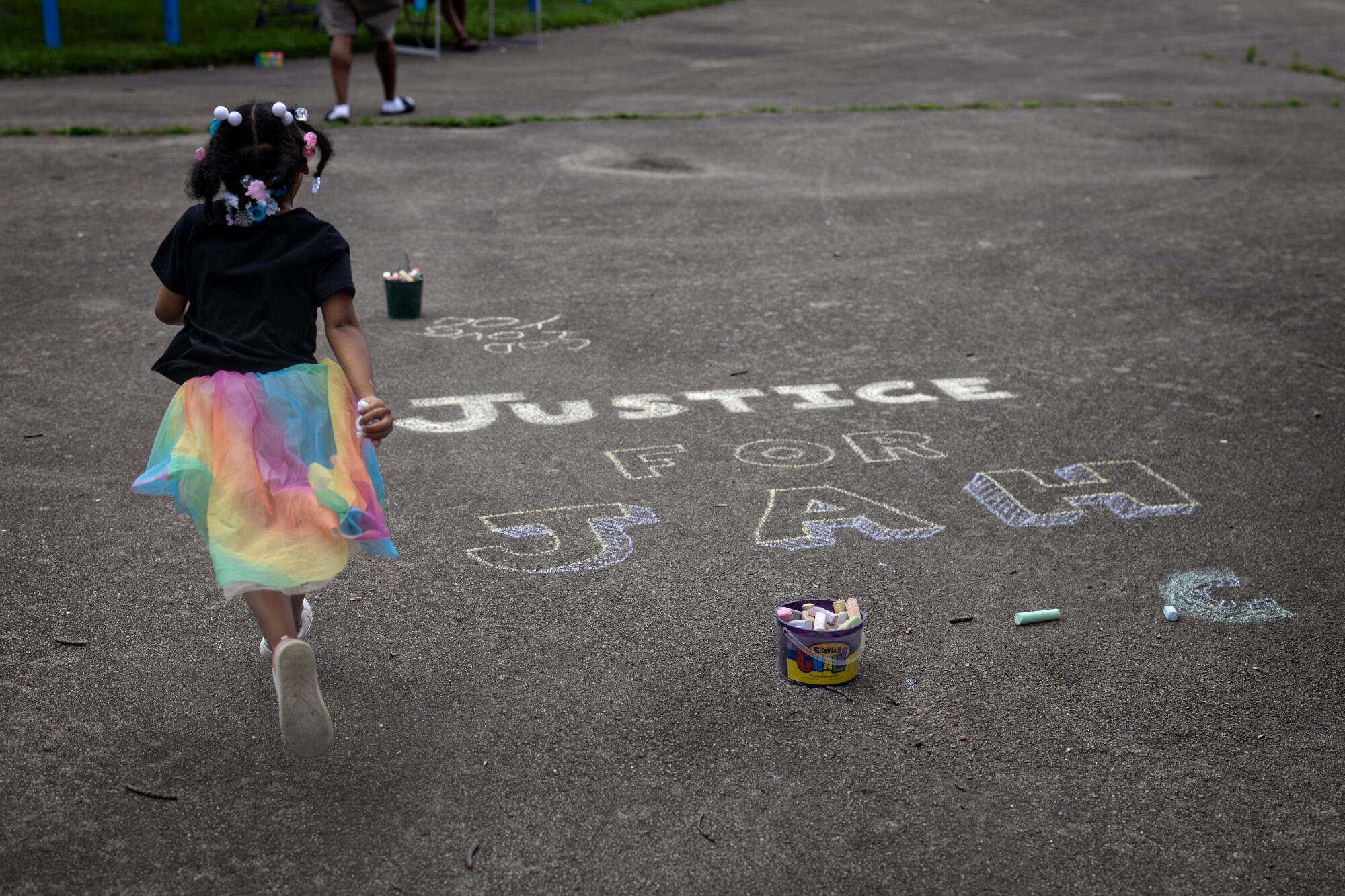
“Justice for Jah” is a reference to Samuel Sharpe Jr., who was killed by members of the Columbus, Ohio Police Department who were in Milwaukee for the Republican National Convention.
(Jason Armond / Los Angeles Times)
Biden will have to decide within days whether to stay or go, and the pressure has mounted intensely.
Democrats plan to call delegates together virtually in early August to formally swear their allegiance. Once that is done, it will become increasingly difficult for another candidate to fill the seat.
But for Lindsay Heights voters, wary of politics and preoccupied with everyday life, time is running out for either party to reach them with a message meaningful enough to get them to the polls.
If this neglect continues, it probably won't make much difference what Biden decides.

